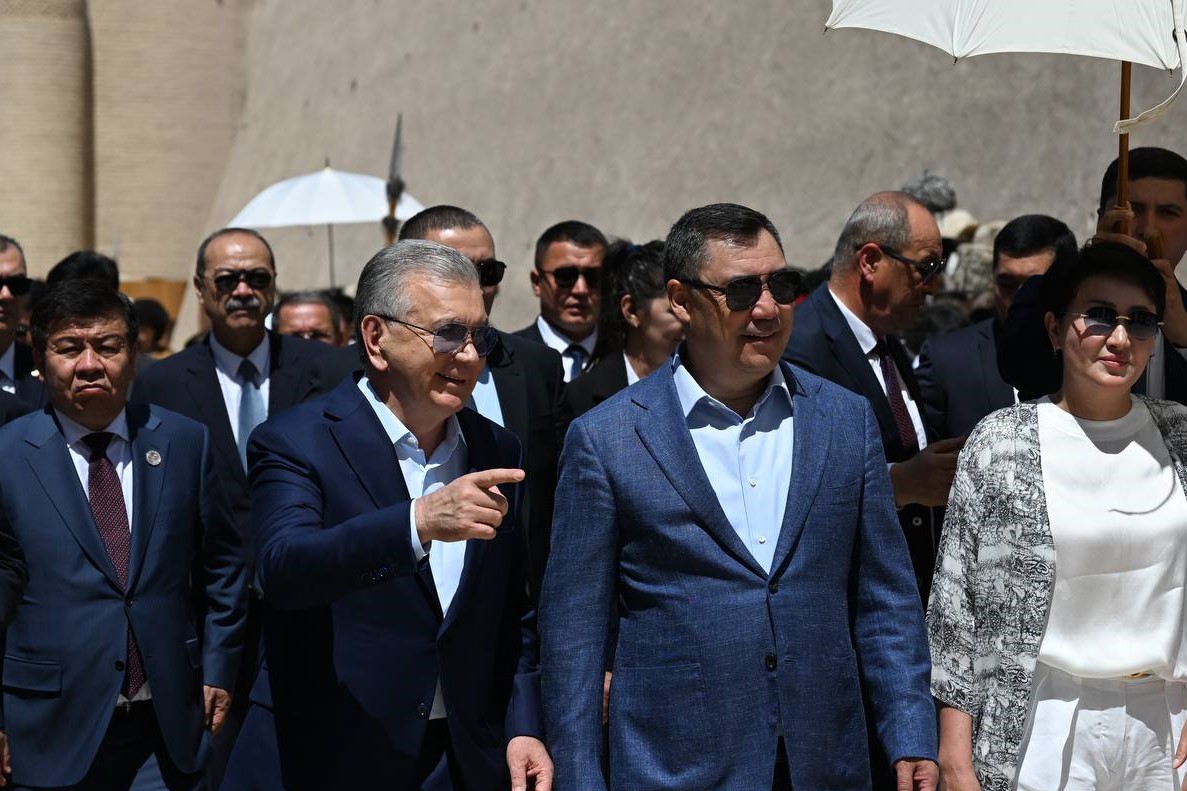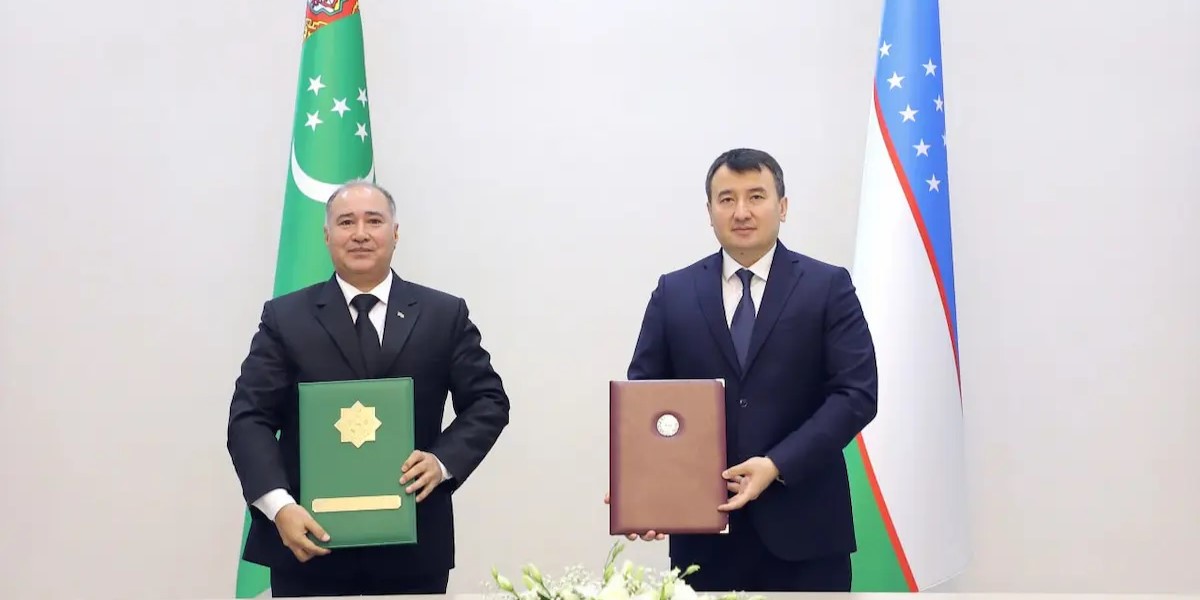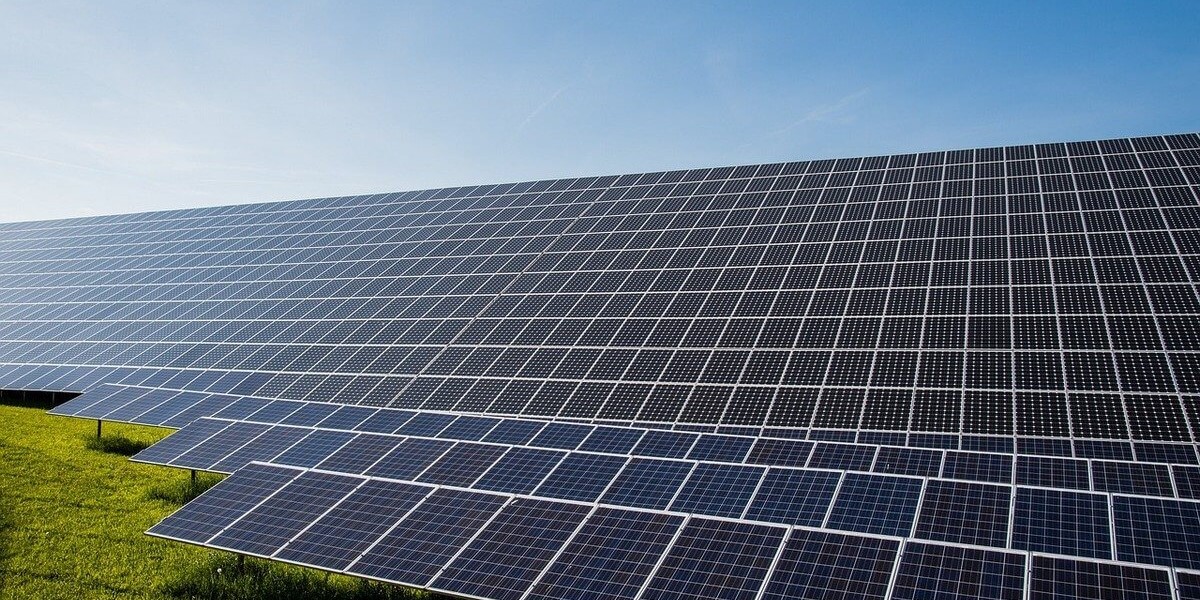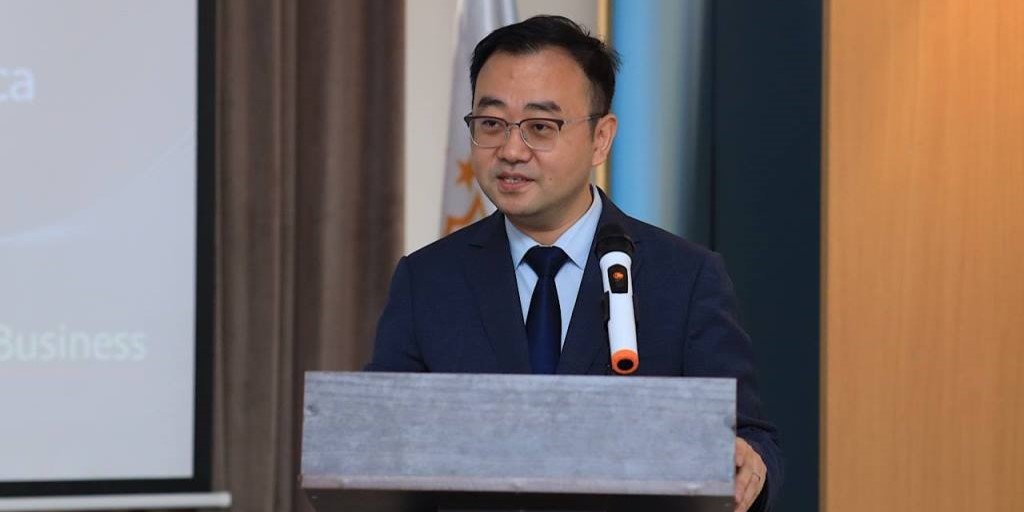This past week, Central Asian media paid attention to the state visit of the President of Kyrgyzstan and his wife to Uzbekistan, Kazakhstan and Uzbekistan joining the first high-level forum of the Minerals Security Partnership (MSP) coordinated by the US and EU, the latest developments in the project on the protection of the North Aral Sea in Kazakhstan, latest news from the energy industry in Central Asia, as well as updates on clean energy transition in the region, agreement on the simplification of transport and logistics between Uzbekistan and Turkmenistan, the launch of 16 joint agreements between Uzbekistan and Tajikistan on various fronts, the launch of Huawei's commercial high-tech solutions in Dushanbe, and Samsung's assistance in the digitization of Kazakhstan's armed forces.

President of Kyrgyzstan Sadir Japarov, accompanied by his wife, arrives in Uzbekistan on a state visit. Source: Daryo
Regional Cooperation
On July 18, Kyrgyzstan's President Sadyr Japarov, accompanied by his wife, arrived in Uzbekistan for a state visit. President Japarov and Uzbekistan's President Shavkat Mirziyoyev discussed various topics and launched several significant joint projects (Daryo). Following their discussion, the two sides signed bilateral agreements and made statements to the press. The leaders agreed to further develop close political dialogue and active engagement at various levels, including parliament, government, foreign policy institutions, functional ministries, regions, businesses, and public circles. Mirziyoyev emphasized the importance of establishing a new comprehensive economic agenda for Uzbekistan-Kyrgyzstan relations. They adopted a plan to increase mutual trade volume, which includes the establishment of trade companies in both capitals and a series of long-term import-export contracts, aiming to raise trade turnover to $2 billion in the coming years (Tashkent Times). Meanwhile, commercial centers will be established in the two capitals and a set of export-import agreements will be formed (Gazeta). The Uzbek-Kyrgyz Development Fund prioritizes financing mutually beneficial investment projects in the agro-industrial, industrial, transport, and tourism sectors, with industrial cooperation already reaching $300 million. To further promote these projects, the two sides agreed to increase the authorized capital of the Uzbekistan-Kyrgyz Fund to $200 million. Notably, one of the key agreements from the current visit is the “WTO Membership Protocol,” seen as another step towards Uzbekistan’s integration into the global trading system (Daryo).
Energy
Kazakhstan's natural gas industry has been steadily growing, with a production plan of 60.5 billion cubic meters for 2024, a 2.3% increase from 2023. In the first half of 2024, production reached 30 billion cubic meters, nearly 50% of the annual target. Energy Minister Almasadam Satkaliyev noted increased transits of Russian gas to Uzbekistan and Kyrgyzstan, and Turkmenistan gas to China, with discussions underway to further increase Russian gas transits to Kyrgyzstan (24 KG). Despite Kazakhstan's retail LNG prices being significantly lower than neighboring countries, illegal gas exports remain an issue, prompting the government to strengthen efforts to curb "grey" exports and establish criminal liability. By the end of 2023, approximately 60% of Kazakhstan's population had access to natural gas (Astana Times). Kazakhstan plans to balance gas supply and demand within the next three years, with gradual gas price increases needed to attract investment. Major infrastructure projects, such as the second line of the Beineu-Bozoi-Shymkent gas pipeline and the Aktobe-Kostanai and Taldykorgan-Usharal pipelines, are in progress. Additionally, from 2026 to 2030, four new gas processing plants will be commissioned, including a facility at the Kashagan field in partnership with Qatar's UCC Holding (Kazakhstan Today). Besides, Kazakhstan’s national oil and gas company, KazMunayGas (KMG), and Italy’s energy company Eni have begun constructing a 247 MW hybrid power plant in Zhanaozen. This project combines wind and solar renewable energy with gas power generation to ensure stable electricity production (Astana Times). The hybrid power plant will ensure a stable and reliable electricity supply to KMG's subsidiaries in the region, mitigating the risk of emergency production shutdowns due to frequent power outages (KMG). This initiative aligns with KMG's decarbonization strategy, aiming to reduce the company’s carbon footprint significantly. Nearly 40% of the power generated will be green energy, substantially cutting CO2 emissions.
Uzbekistan's President Shavkat Mirziyoyev announced that the country has saved 1.5 billion cubic meters of natural gas since the beginning of this year thanks to the commissioning of new green energy capacities. By 2030, Uzbekistan plans to increase its renewable energy capacity to over 20 GW, which will account for approximately 40% of the country's total energy balance (Kun). In 2025, two wind farms with a combined capacity of 500 MW will be operational in the Peshku and Gijduvan districts of the Bukhara region. Additionally, in 2026, four wind farms with a total capacity of 1,600 MW will be launched in the Republic of Karakalpakstan.
China Southern Power Grid International (Hong Kong) Co., Ltd. has completed the acquisition of a 35% stake in two wholly-owned subsidiaries of Saudi Arabia's ACWA Power. This acquisition grants Southern Power Grid partial ownership of the Bash wind farm in Bukhara and the Dzhankeldy wind farm in Navoi, Uzbekistan, as well as the associated 500 kV transmission projects (Jiemian). According to Arab News, the transaction amount between the Chinese and Saudi companies is $158.8 million (Kursiv). ACWA Power stated that this transaction marks the first joint investment between ACWA Power and Southern Power Grid in large-scale renewable energy projects in Central Asia since the signing of a framework agreement in December 2022. Previously, these two wind power projects were constructed by China Energy Engineering Corporation (CEEC) (CCEDIA).

Uzbekistan and Turkmenistan agree to enhance transport and logistics connections. Source: Gov.Uz
During negotiations in Tashkent, the deputy prime ministers of Uzbekistan and Turkmenistan agreed to focus on enhancing transport and logistics connections between the two countries. They discussed integrating Turkmenistan into existing and planned multimodal transport corridors and simplifying visa procedures for carriers (Daryo). The meeting also covered cooperation in the automotive, chemical, and electrical industries, opening new opportunities for mutual trade and services.
Elsewhere, Russian Deputy Prime Minister Alexander Novak announced in an interview with TASS that Russia, Azerbaijan, and Iran will be enhancing their cooperation within the framework of the International Transport Corridor (ITC) "North-South." Initiated in 2000 by Russia, Iran, and India, the ITC now includes 12 members and comprises three routes: the western route along the Caspian Sea coast through Azerbaijan, the eastern route across the Caspian Sea, and the central route (Kommersant). Novak highlighted that Russia has reached an agreement with Iranian partners to complete a 162-kilometer missing railway section between the Iranian cities of Astara and Rasht, finalizing the western route (Report). This project aims to seamlessly connect the Baltic Sea to the Persian Gulf through a unified transport corridor.
Mining
Kazakhstan and Uzbekistan have joined the Minerals Security Partnership (MSP) Forum, coordinated by the US and EU, to enhance the sustainable and diversified supply of critical minerals. The forum, which aims to foster interaction between mineral-producing countries and private sector companies, welcomed eight new members, including Kazakhstan and Uzbekistan, during its high-level virtual meeting on July 18 (Kaz Inform). Previously, members of the Forum included the US, Australia, Canada, Estonia, Finland, France, Germany, India, Italy, Japan, the Republic of Korea, Norway, Sweden, the UK and the EU (represented by the European Commission) (U.S. Department of State). The MSP, established in June 2022, aims to strengthen partnerships with mineral-producing countries by promoting high environmental, social, and governance standards. The first forum was launched by Secretary of State Antony J. Blinken and European Commission Executive Vice President Valdis Dombrovskis in March 2024, focused on deepening cooperation and developing individual projects to ensure resilient and diversified supply chains of critical minerals (U.S. Department of State). During the event, the MSP Forum Co-Chairs, the US, and the EU shared the main objectives and a roadmap for the MSP Forum, including its two work streams, project development and policy dialogue (European Commission). Kazakhstan and Uzbekistan’s involvement signifies that the two countries in the Central Asian region are actively engaged in energy cooperation with the Western countries. Previously, some Chinese media had noted that this forum shows a new round of international competition over critical minerals in the clean energy sector, where China holds a leading position. China dominates the global supply chain for clean energy products, particularly in the development and processing of rare earth elements (The Paper).

Kazakhstan and China to produce solar panels in Almaty. Source: Golos Naroda
Green Transition
On July 17, Kazakhstan, in collaboration with a Chinese company, began the production of solar panels in Almaty. The construction of the factory is scheduled to be completed by the end of this year (Golos Naroda). This project aims to not only boost production capacity in the renewable energy sector but also to develop a high-tech workforce in the region, thereby strengthening Kazakhstan's position in the green technology market. Spanning over two hectares, the factory will be equipped with modern facilities and will produce up to 250,000 solar modules annually.
On July 18, Azerbaijan signed three Memoranda of Understanding (MoUs) worth $25 million with a private company in Kabul for solar power projects. These projects, with a total production capacity of 8 megawatts, will be implemented in the provinces of Uruzgan, Paktika, and Farah (Tolo News). Upon completion, the projects are expected to provide electricity to more than 5,000 families. Additionally, the acting Minister of Energy and Water of Afghanistan Abdul Latif Mansour announced the initiation of a 100-megawatt solar power project aimed at reducing power outages in Kabul in the near future.
China Datang Corporation is investing in the construction of a solar power plant with a capacity of up to 500 MW in Tajikistan's Sughd region. The project, with an estimated investment of $150 million, will cover an area of 621 hectares and eventually reach a capacity of 263 MW (Neftegaz). Upon completion, Tajikistan's national grid company will purchase electricity from the plant for a period of 25 years (Siluxgc). Additionally, the regional head, R. Ahmadzoda, met with experts from a Beijing research institute to study the construction of two new railway lines from Spitamen to Istaravshan and Istiqlol, spanning 171 kilometers. Another Chinese company, Eging PV Technology Co. Ltd, will build a 200 MW solar power station in southwestern Tajikistan. The project, costing $1.5 billion, will begin in July and is expected to complete the first of four phases by March 2025 (PV Magazine). By 2030, Tajikistan plans to nearly double its generating capacity to 10 GW.
Climate Emergency
In response to the flooding in the Osh region, Kazakhstan and Uzbekistan have provided humanitarian aid to the affected residents. Kazakhstan has delivered 40 tons of aid, including food, clothing, and essential supplies. To assist with the loading and distribution of the humanitarian goods, Akezhan Kenesov, head of the Almaty branch of Zhastar Rukhy, mobilized volunteers (Kursiv). Uzbekistan’s multiple trucks of aid were delivered to Osh by the leader of Andijan province, Shukhrat Abdurakhmanov, who personally visited the Osh region and offered his condolences (Nova 24).
Water Management
In collaboration with the World Bank, the Ministry of Water Resources and Irrigation of Kazakhstan has completed the first phase of the North Aral Sea protection project, which involved constructing the Kok-Aral Dam. According to Kazakhstan's Minister of Water Resources and Irrigation, Nurzhan Nurzhigitov, the second phase aims to improve water resource management, promote fisheries and ecotourism, and enhance the region's environmental conditions (Kazakhstan Today). Kazakhstan, having taken over the presidency of the International Fund for Saving the Aral Sea earlier this year, continues to prioritize the protection of the Caspian and Aral Seas. President Tokayev reiterated the importance of collective efforts to address these environmental issues at the summit of the Organization of Turkic States on July 6 (Akorda).

Ma Tian, CEO of Huawei Tajikistan, presents high-tech solutions for commercial businesses in Dushanbe. Source: Asia Plus
Technology
On July 18, Huawei showcased its high-tech solutions for businesses in Dushanbe. Around 80 attendees, including representatives from the business sector, government ministries, and local partners, were present (Asia Plus). The event aimed to introduce Huawei's advanced digital products and solutions, supporting digital and intelligent business transformation. Huawei experts presented various solutions, including IP networking, data storage, optical networking, smart devices, and remote communication systems, with applications in retail, healthcare, and smart city development.
Samsung Electronics Central Eurasia has signed an MoU with Kazakhstan's Ministry of Defense to assist in digitalizing the country's armed forces. The cooperation includes providing high-tech solutions such as military-grade mobile tablets and smartphones with built-in security mechanisms (Daryo). These devices will enhance the operational capabilities of Kazakhstan's ground forces, with future initiatives aimed at digitalizing unit navigation, optimizing command processes, and integrating mobile solutions with drones and sensors for intelligence purposes.
Security
Following last week's report on the arrest of a drug trafficker and flooding in the Osh region, new developments have come to light. The arrested man was a key organizer in a large-scale drug trafficking operation from Morocco to Spain. Interpol Spain had wanted him for his involvement in smuggling cannabis and he is currently placed in a temporary detention center awaiting extradition resolution (24 KG).

